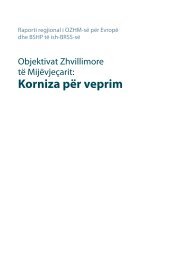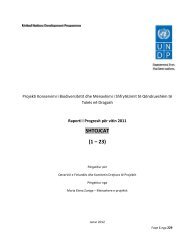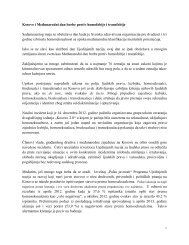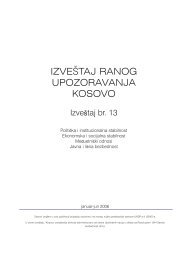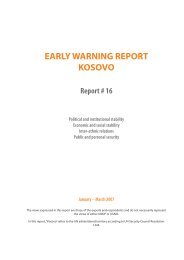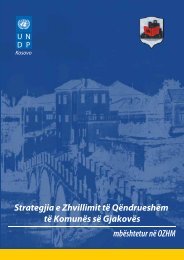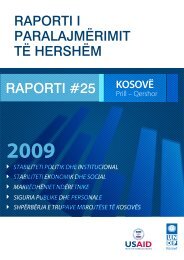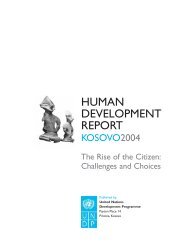Kosovo Human Development Report 2010 - UNDP Kosovo - United ...
Kosovo Human Development Report 2010 - UNDP Kosovo - United ...
Kosovo Human Development Report 2010 - UNDP Kosovo - United ...
You also want an ePaper? Increase the reach of your titles
YUMPU automatically turns print PDFs into web optimized ePapers that Google loves.
Table<br />
5.2<br />
ion in <strong>2010</strong> indicates that youth feel<br />
largely ignored by decision-makers,<br />
with only 5.5 percent certain that<br />
their voices are heard by those in<br />
authority.<br />
Youth activism is stifled in part<br />
through lack of institutional organization.<br />
In <strong>2010</strong>, there were 13 active youth<br />
centres in <strong>Kosovo</strong>. Half of them lacked<br />
basic facilities and resources that would<br />
Voting patterns by age group<br />
Source: <strong>Kosovo</strong> Mosaic Survey, <strong>UNDP</strong> 2009<br />
allow them to function. Since the Ministry<br />
of Youth, Culture and Sports was<br />
established only about five thousand<br />
young people have benefited directly,<br />
out of a population of approximately<br />
1 million under the age of 25. 190 And<br />
yet, the desire to believe in the political<br />
process is still evident. The proportion<br />
of young people who feel there is<br />
little point in voting is still outweighed<br />
by those who believe that voting serves<br />
some purpose (19.7 percent versus 46.5<br />
percent). A UNICEF survey of youth<br />
opinion in <strong>2010</strong> noted a distinct correlation<br />
between belief in the political<br />
process and ethnic identity, i.e., <strong>Kosovo</strong>-<br />
Albanians has the greatest faith in the<br />
process and <strong>Kosovo</strong>-Serbs the least.<br />
Similarly, boys were given much more<br />
opportunity than girls to participate in<br />
after-school activities that might allow<br />
political engagement and youth activism<br />
to flourish. A girl’s safety, reputation<br />
and housework were prioritized by families<br />
over her political engagement.<br />
(iii) Ethnic minorities, particularly those<br />
without civil status: <strong>Kosovo</strong> has a<br />
poor record of including its minori-<br />
84 | KOSOVO HUMAN DEVELOPMENT REPORT <strong>2010</strong><br />
% Voting<br />
Age Group<br />
18-24 25-45 >45 Total<br />
I didn’t vote 29.8 17.9 27.1 23.4<br />
Didn’t attend municipal public meeting 95.4 90.5 88.7 91.3<br />
FIGURe<br />
35%<br />
30%<br />
25%<br />
20%<br />
15%<br />
10%<br />
5%<br />
0%<br />
Very<br />
effective<br />
ty groups in the political process, or<br />
making efforts to overcome self-exclusion.<br />
Exclusion is particularly rife<br />
among two ethnic groups: <strong>Kosovo</strong>-<br />
5.3<br />
Yes, rather<br />
effective<br />
Neither<br />
effective nor<br />
effective<br />
Youth belief in effectiveness<br />
of voting to improve the<br />
country (15-24 years old)<br />
13.20% 33.30% 18.80% 10.90% 8.80% 15.10%<br />
No, rather<br />
effective<br />
No, very<br />
effective<br />
Don’t know<br />
Source: Unleashing Change: <strong>Kosovo</strong> Voices of Youth,<br />
UNICEF <strong>2010</strong><br />
Serbs and <strong>Kosovo</strong>-RAE communities.<br />
Both groups are institutionally<br />
excluded and self-excluded. The<br />
overwhelming majority (86 percent)<br />
of <strong>Kosovo</strong>-Serbs did not vote<br />
in the 2007 elections. 191 In the local<br />
elections of 2009, the number<br />
of voters among the <strong>Kosovo</strong>-Serb<br />
population increased. For these<br />
elections, 22 <strong>Kosovo</strong>-Serb political<br />
entities were certified and participated<br />
in 17 <strong>Kosovo</strong> municipalities,<br />
including the three municipalities<br />
in northern <strong>Kosovo</strong> – Zvecan/Zvecane,<br />
Leposaviq/Leposavic and Zubin<br />
Potok. However, there was no<br />
<strong>Kosovo</strong>-Serb turnout of voters in<br />
northern <strong>Kosovo</strong>. This boycott was<br />
partially ascribed to intimidation<br />
and threats by Serb parallel security<br />
forces and the mobilization of<br />
<strong>Kosovo</strong>-Serb radical political forces<br />
against the elections - and also lack<br />
of a credible <strong>Kosovo</strong>-Serb political<br />
entity participating in the elections.<br />
192<br />
The degree of <strong>Kosovo</strong>-Serbs’ exclusion<br />
from political processes is reflected<br />
in their assessment of how mayors<br />
perform. Asked about their satisfaction



